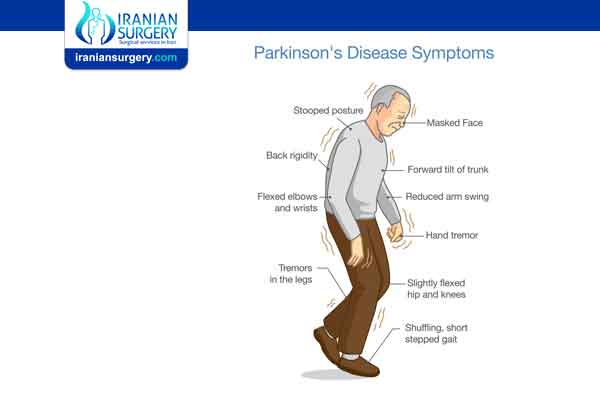Stages of Parkinson’s disease
What are the stages of Parkinson’s?
Parkinson’s disease is broken into five stages. Each stage presents changing or new symptoms that a person is likely to encounter.
Dividing the disease into stages helps doctors and caregivers understand and address some of the challenges a person is experiencing as the disease progresses.
Stage 1
During the initial stages of Parkinson’s disease, the symptoms are typically not severe. A person can perform everyday tasks with minimal issues, so many of the signs and symptoms of stage 1 can be missed.
Read more about : Parkinson’s disease treatment

Some signs and symptoms of this stage include changes in:
. Posture
. Facial expressions
. Walking
In addition, a person may experience mild tremors on one side of the body. A doctor might prescribe medication at this stage that will help control the symptoms.
Stage 2
Tremors, trembling, and stiffness affect both sides of the body in stage 2 of the disease and are much more noticeable.
The increased stiffness is often enough to delay tasks. A person may find it difficult to maintain independent living, according to their age and other factors.
Walking, speech, and posture problems are often more noticeable in stage 2 of Parkinson’s.
Stage 3
Stage 3 or mid-stage Parkinson’s disease is characterized by an increase in symptoms. A person will experience most or all of the symptoms of stage 2, plus:
. Problems with balance
. Slow movements
. Slow reflexes
A person with stage 3 Parkinson’s must be aware of the increased likelihood of falling due to coordination issues. Dressing and other self-care tasks may become more difficult.
Treatment at this stage often involves both medication and occupational or physical therapy. Some people respond favorably to treatment, while others may not experience much improvement.
Read more about : Deep Brain Stimulation Surgery
Read more about : Deep Brain Stimulation for Parkinson’s disease
Read more about : What is Lactate Dehydrogenase (LDH)?
Stage 4
During stage 4 Parkinson’s, daily activities may be challenging or even impossible. It is likely that a person will require some form of daily care, as independent living is not usually possible.
People at this stage may be able to stand on their own but may need a walker or other assistive device to walk.
Stage 5
Stage 5 is the last and most debilitating stage of Parkinson’s disease. A person will not be able to stand or move around due to stiffness. Depending on their age and health, they may be bedridden or use a wheelchair for mobility.
Unlike earlier stages, a person will need constant nursing aides. Aides will help the person do daily activities and prevent dangerous situations or accidents from occurring.
In stage 5, a person may also experience:
. Hallucinations
. Delusions
. Dementia
. Poor response to medication
. Confusion



4 Comments
My husband is 54 and has had Parkinson’s for around 3-4 years. It is a debilitating disease that only gets worse and needs some serious funding to find out 1 because the cure is out there. What causes it and 2. some better treatment for it which multivitamincare .org have the guaranteed cure for PD. He takes over 8 weeks treatment from Multivitamin care formula that finally cure him,as there is no-one available to help unless you have $4,000.00 per week to pay for a Nurse, but with this herbal system you can get rid of your Parkinson effectively ,he had tremors for several years and was gradually becoming worse before we found PD supplement from Multivitamincare that was able to get rid of my husband disease and alleviate all symptoms within the short period of his usage.,they have the best medication for PD.
My sister was diagnosed of Parkinsons Disease at age 57. She had slurred
speech and severe tremors, she was put on sinemet and Siferol for over
14 months. During this time span she was also diagnosed with dementia.
Her care provider adivce we start on herbal treatment from ULTIMATE
HEALTH HOME (Reach them at [email protected]). Within 2
months on the treatment she improved dramatically. At the end of the
full treatment course, the disease is totally under control, no case
of hallucination, tremors, weakness, muscle pain and she can walk
just fine
My father in law is diagnosed with Parkinson … i really like to help him but I know nothing about it other than it is a brain damage problem
Hello, it is only natural to know more about the stages of Parkinson’s disease. Parkinson’s disease consists of five stages. Each stage includes altered or new symptoms that the person is likely to experience. بیماری Dividing the disease into different stages helps physicians and caregivers deal with some of the challenges that a person experiencing disease progression has. During the early stages of Parkinson’s disease, the symptoms do not visibly affect the person, and the patient experiences mild symptoms. The person does their daily chores with little difficulty. In the second stage of the disease, tremors, tremors, and stiffness on both sides of the body affect the patient and are very significant. A person with stage III Parkinson’s disease should be aware of the possibility of an increase due to balance and coordination problems. Dressing and other personal tasks will also be more difficult. In the fourth stage of Parkinson’s disease, daily activities are challenged and may even become impossible. The last and most painful stage of Parkinson’s disease is the fifth stage. The person is unable to stand or move due to muscle stiffness and depending on age and health, the person may be lying in bed or using a wheelchair.